Finding Quality and Reliability in Mortuary Refrigeration
A mortuary cold room manufacturer specializes in creating temperature-controlled environments designed specifically for the dignified preservation of the deceased. When selecting a manufacturer, focus on these essential qualities:
- Experience: Look for manufacturers with 10+ years in the industry
- Customization Options: Ability to design to your specific space and capacity needs
- Temperature Control: Systems that maintain 2-5°C with ±1°C precision
- Construction Materials: High-density polyurethane foam insulation (42±2 kg/m³)
- Compliance: NSF certification and UL safety standards
- Service Support: Comprehensive warranties (typically 10 years on panels, 1 year on compressors)
Selecting the right mortuary cold room is a critical decision that impacts your facility's operations, energy costs, and most importantly, the respectful care of those entrusted to you. The right manufacturer should offer solutions that balance technical performance with practical usability.
I'm Mortuary Cooler, a national-level mortuary cooler supplier with extensive experience working with leading mortuary cold room manufacturers across the United States. My background in U.S. cooler supply has given me insights into what makes a reliable and efficient mortuary refrigeration system.
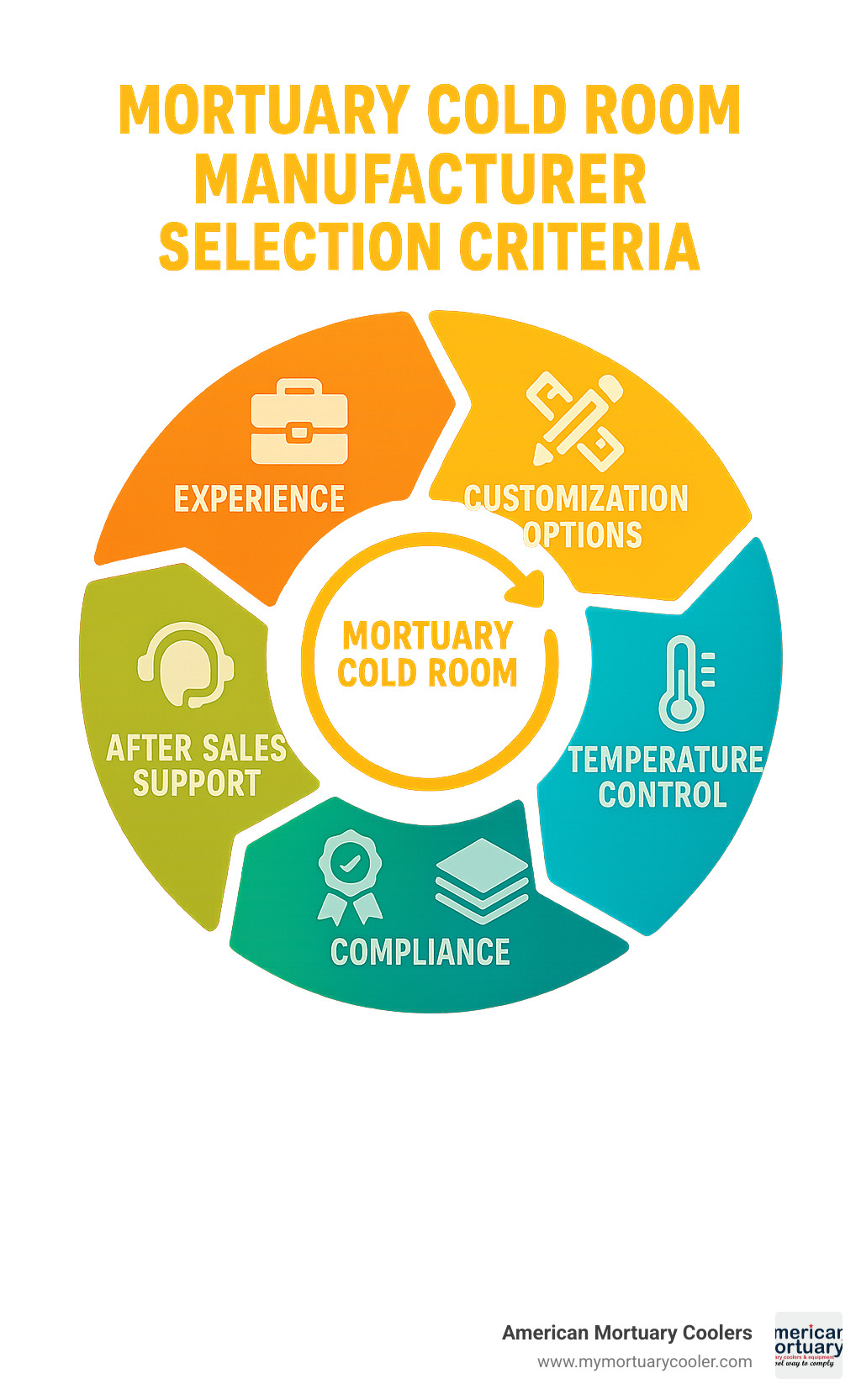
Mortuary cold room manufacturer vocabulary:
What Is a Mortuary Cold Room & Why Temperature Control Is Critical
A mortuary cold room is a specialized refrigeration unit designed to store human remains at controlled low temperatures to slow decomposition processes and maintain the dignity of the deceased before burial, cremation, or other funeral services. These purpose-built environments serve funeral homes, hospitals, medical examiners' offices, and forensic facilities.
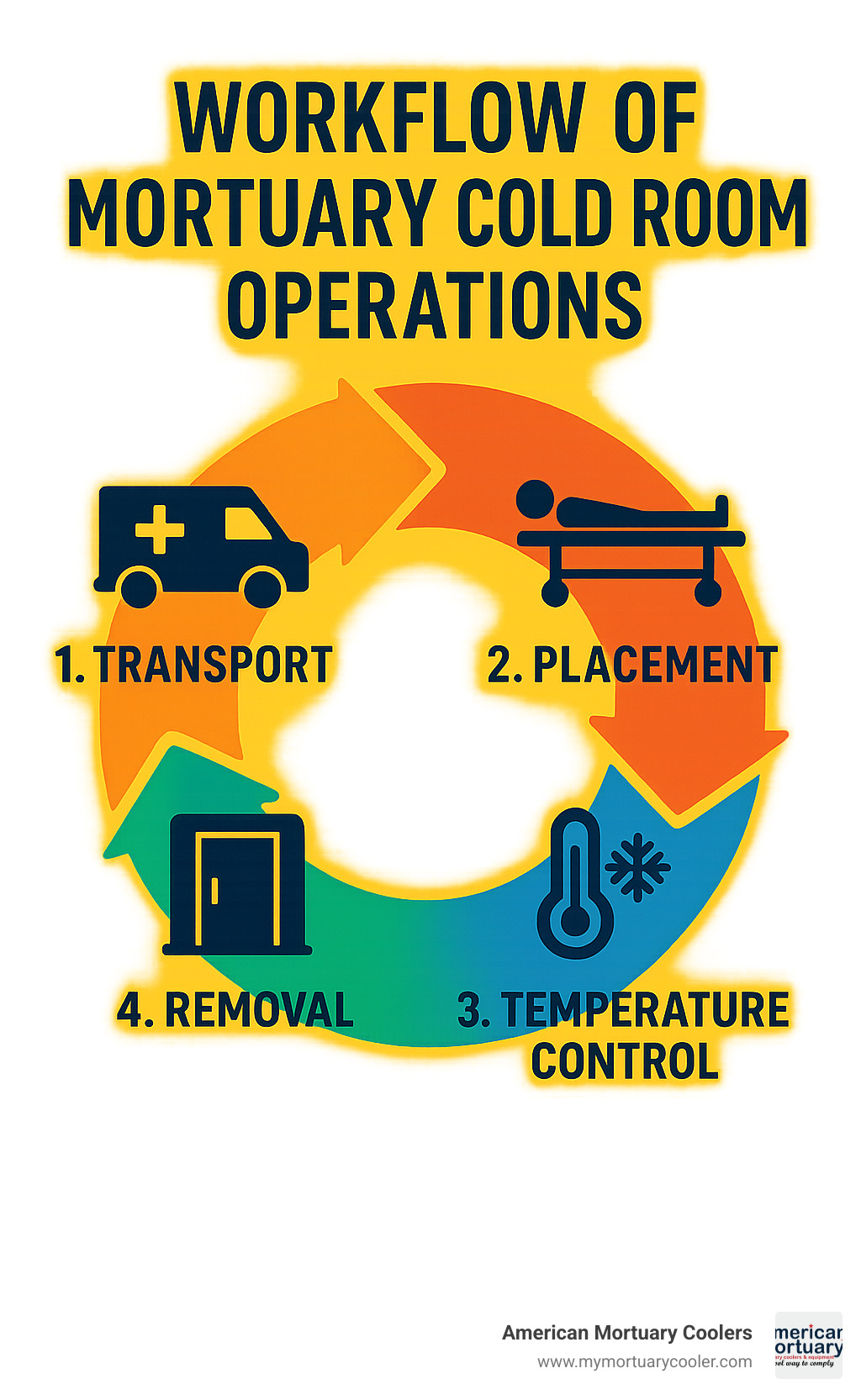
I remember when I first toured a funeral home's facilities. The director explained, "A mortuary cold room isn't just a big refrigerator. It's a specialized space where we ensure loved ones are kept in a dignified and respectful condition until their final farewell." This perfectly captures what sets these units apart from standard refrigeration.
The heart of a quality mortuary cold room is its precise temperature control. Most units maintain temperatures between 2°C and 5°C (35.6°F to 41°F) – the sweet spot for preservation without causing freezing damage to tissues. This isn't a suggestion – it's a requirement with tolerance of no more than ±1°C to ensure consistent preservation.
Sometimes, circumstances call for colder temperatures. Freezer-grade mortuary cold rooms operating at approximately -20°C (-4°F) serve special needs like long-term storage or forensic cases where evidence preservation is crucial.
Beyond just "keeping cool," these specialized rooms serve several vital purposes:
They give families the precious gift of time to arrange meaningful funeral services. They support forensic investigations by maintaining evidence integrity. They respect cultural and religious practices that require specific timing for funeral rites. And during tragic mass fatality events, they provide essential surge capacity.
Typical Temperature Ranges & Controls
Modern mortuary cold rooms have come a long way from the simple coolers of decades past. Today's units feature sophisticated digital PID (Proportional-Integral-Derivative) controllers that maintain temperature precision within ±1°C – something that would have seemed like science fiction not long ago.
The technology behind these rooms continues to advance. Remote monitoring capabilities now allow staff to check conditions from anywhere, even receiving alerts on their phones if temperatures drift. Automatic defrost cycles prevent ice buildup without compromising the storage environment. Data logging creates detailed records for regulatory compliance, and dual-zone systems can maintain different temperatures in separate areas of the facility.
"It's like having a guardian angel watching over your loved ones," explains one of our technicians at American Mortuary Coolers. "These systems work 24/7 to maintain the perfect environment."
Peace of mind comes from knowing there's backup. Most modern units include redundant cooling systems and battery backup for control systems during power outages – because preservation can't take a break.
More info about temperature specs
Hygiene, Health & Safety Compliance
When it comes to mortuary cold rooms, cleanliness isn't just about appearance – it's a matter of health, safety, and dignity. The best mortuary cold room manufacturers design their products to exceed industry standards for sanitation.
Think of the materials as the first line of defense. High-quality units feature 304-grade stainless steel interiors that resist corrosion and clean up beautifully. The walls contain high-density polyurethane foam insulation (typically 42±2 kg/m³) that not only keeps the temperature stable but prevents gaps where contaminants could hide. Even the lighting is specially designed as vapor-proof fixtures to prevent moisture buildup that could become a breeding ground for bacteria.
Compliance isn't optional in this industry. Leading manufacturers ensure their units meet NSF certification for sanitation standards, UL safety listings for electrical safety, and include OSHA-compliant safety release handles – because nobody should ever be accidentally trapped inside.
"We build our mortuary cold rooms thinking about the people who'll work with them every day," shares our design team at American Mortuary Coolers. "Everything from the antimicrobial interior finishes to the seamless fiberglass construction is chosen to make cleaning thorough but simple."
The care continues with regular maintenance. Facilities typically follow a rhythm of daily surface disinfection, weekly deep cleaning of racks and trays, monthly inspection of door seals, and quarterly professional sanitization. This diligence honors both the deceased and protects the health of staff members who serve families during their most difficult moments.
Core Features & Construction Materials That Define Quality
The quality of a mortuary cold room largely depends on its construction materials and core features. When evaluating a mortuary cold room manufacturer, understanding these elements helps identify superior products.
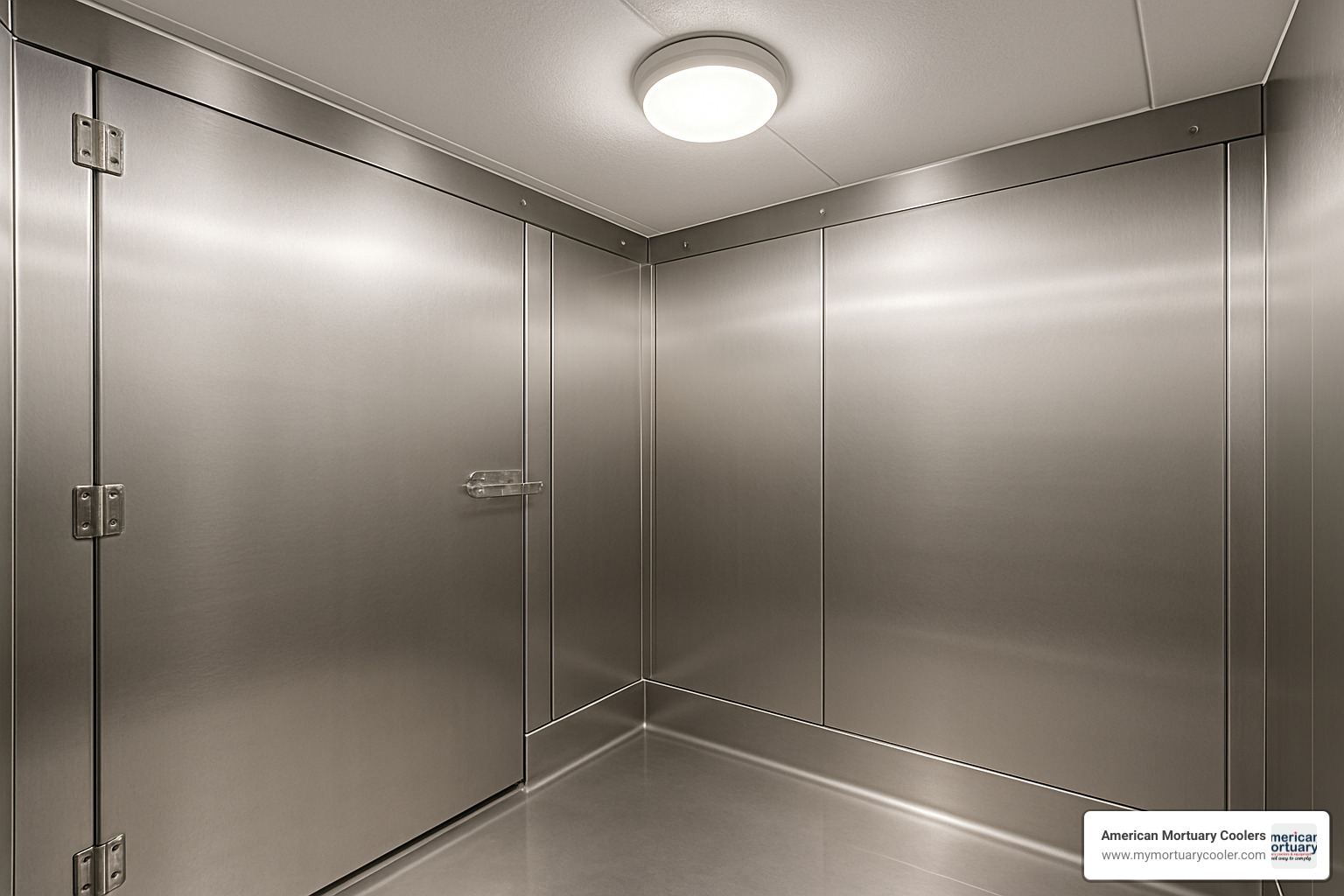
When I visit funeral homes to discuss their refrigeration needs, I'm often asked, "What makes one cold room better than another?" The answer lies in the details of construction and materials.
Quality mortuary cold rooms feature insulated panels between 4 and 10 inches thick, with 4 inches (about 100mm) being the industry sweet spot for balancing efficiency with space requirements. These panels connect using either cam-lock systems or tongue-and-groove connections. The cam-locks allow for quicker assembly and potential relocation down the road—perfect if you might need to move the unit someday. Tongue-and-groove connections, on the other hand, create a superior air seal and structural integrity for permanent installations.
The insulation material makes a huge difference too. XPS (Extruded Polystyrene) offers consistent thermal resistance and stands up well to moisture, while FIP (Foamed-in-Place Polyurethane) provides even better thermal performance and structural strength. As we like to tell our customers at American Mortuary Coolers, both materials work well, but FIP generally works best for permanent installations while XPS gives you more flexibility for modifications.
Inside the cold room, the racking system determines how efficiently you can use the space. Quality manufacturers offer cantilever storage racks that maximize accessibility, bariatric-rated trays supporting larger bodies (typically up to 150kg), and adjustable shelf configurations that adapt to your changing needs.
Other essential quality features that shouldn't be overlooked include vapor-proof lighting (preventing moisture buildup inside fixtures), door heaters (eliminating condensation around door frames), fire-retardant panels (improving safety), and reinforced flooring (supporting heavy loads without sagging). These details might seem small, but they make a world of difference in daily operation.
Benefits of Robust Design
Investing in a well-built mortuary cold room pays dividends far beyond basic preservation capabilities. I've seen how quality construction transforms a facility's operations.
Improved Thermal Efficiency means your unit will use significantly less energy—typically 30% less than standard commercial refrigeration. One funeral director in Nashville told me his electric bill dropped nearly $200 monthly after upgrading to our high-efficiency unit.
Odor Management is crucial in funeral settings. Superior sealing and materials that resist bacterial growth help contain and minimize odors, especially important when family viewing areas are nearby. As one customer put it, "The difference is night and day—our old unit always had that telltale smell no matter how much we cleaned it."
Quiet Operation matters more than you might think. Quality compressors and fan systems operate below 65 decibels, ensuring minimal disruption during services. When families are grieving, the last thing they need is the constant hum of machinery in the background.
Extended Service Life represents real value. Premium mortuary cold rooms typically come with 10-year warranties on wall and ceiling panels and 1-year standard coverage on compressors (with optional extended exchange programs available). This longevity translates to better return on investment over time.
Environmental & Energy Efficiency Considerations
Today's leading mortuary cold room manufacturers understand that environmental sustainability isn't just good for the planet—it's good for your bottom line too.
Modern units feature high R-value insulation (typically R-25 to R-35 per inch thickness) that dramatically reduces energy consumption. At American Mortuary Coolers, we use insulation with optimal density (42±2 kg/m³) to maximize thermal resistance without adding unnecessary weight or cost.
The refrigerants used have evolved significantly too. Low-GWP (Global Warming Potential) options like R-134a have largely replaced older CFC refrigerants, while newer blends like R-448A offer even smaller environmental footprints. This shift isn't just about compliance—it's about responsible stewardship.
Energy-efficient components make a substantial difference in operating costs. LED interior lighting uses up to 75% less electricity than fluorescent fixtures while providing better illumination. ECM fan motors consume 30-40% less power than standard motors. Smart defrost cycles operate only when needed rather than on fixed schedules, preventing unnecessary energy use.
Some forward-thinking facilities are even connecting their mortuary refrigeration to existing solar infrastructure. One customer in Arizona reported offsetting nearly 60% of their unit's energy consumption through solar integration, dramatically reducing both their carbon footprint and monthly expenses.
According to research from Emerson Climate Technologies, implementing these efficiency measures can reduce energy consumption by up to 40% compared to systems manufactured just a decade ago. That's not just good environmental policy—it's smart business.
Scientific research on energy-efficient refrigeration
Types of Mortuary Cold Rooms & Customization Options
The world of mortuary refrigeration offers a variety of solutions to match different needs, spaces, and budgets. Whether you're running a small funeral home or a large medical examiner's office, understanding your options helps you make the right choice for your facility.
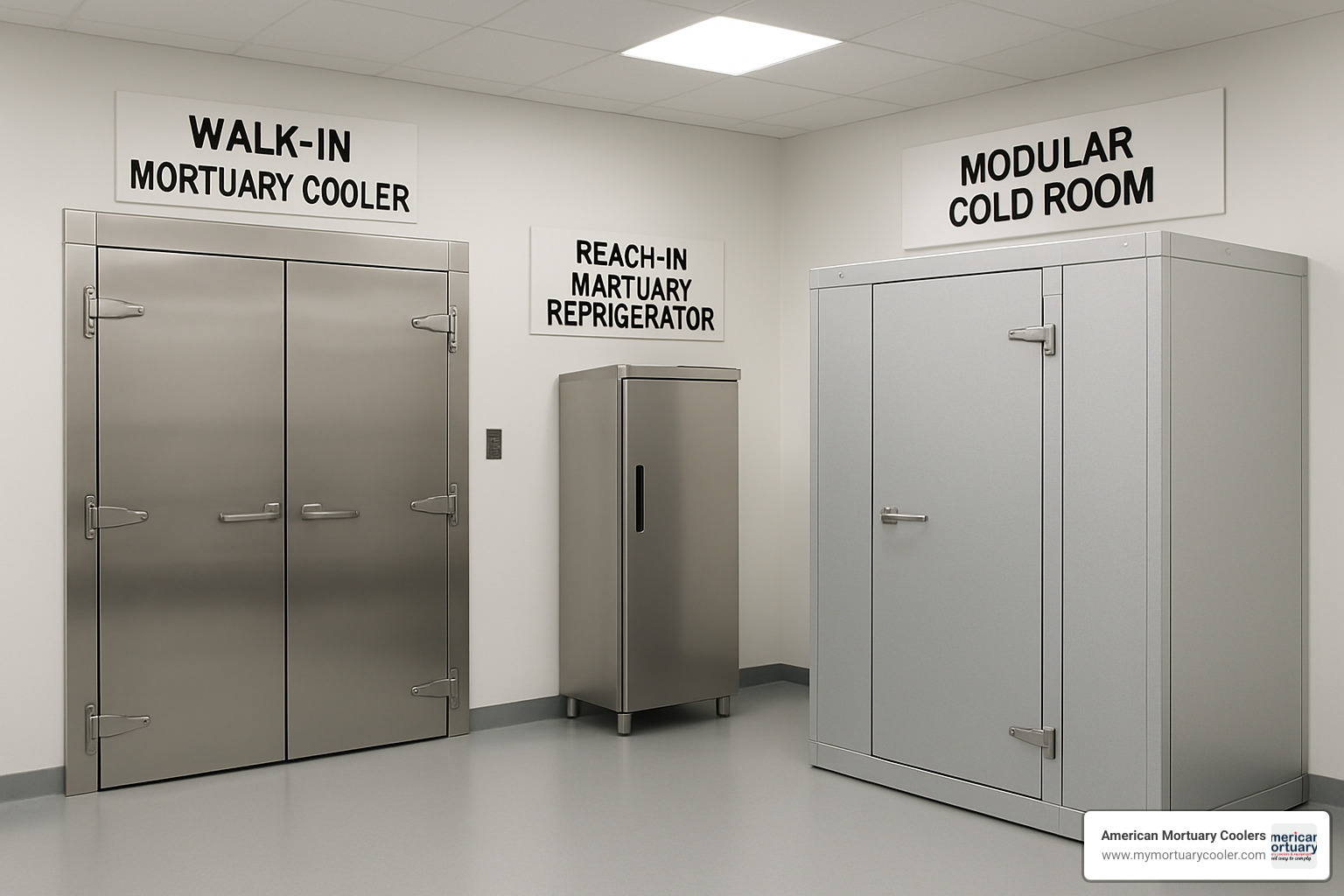
Walk-in mortuary cold rooms represent the premier choice for facilities with substantial storage needs. These spacious units feature modular prefabricated panels that snap together during installation and can be expanded later if needed. They can accommodate anywhere from 5 to 50 bodies depending on your configuration, and their interior dimensions can be customized to fit your available space. You can even choose from different door types—swing, sliding, or bi-parting—to match your workflow.
For facilities with tighter spaces or lower volume needs, body box refrigeration provides a more compact solution. These units come in various sizes, holding anywhere from a single body up to 23, with configurations including 2-tier, 3-tier, and 4-tier options. You might prefer front-loading, side-loading, or even pass-through designs depending on your room layout. Their smaller footprint makes them perfect for facilities where space comes at a premium.
Flexibility matters too, which is why modular and mobile solutions have become increasingly popular. Trailer-mounted mobile mortuary units can be deployed wherever needed, while innovative curtain-based systems like Flexmort's ColdSpace can temporarily convert existing rooms into cold storage. For single-body transportation and temporary storage, portable roll-in refrigerators offer convenience and practicality.
Some situations call for specialized options. Mortuary cold room manufacturers now offer bariatric units specifically designed for larger individuals, dual-temperature systems that provide both standard refrigeration (2-5°C) and freezer sections (-20°C) in one unit, and even rotating warehouse systems that maximize storage capacity in limited footprints.
At American Mortuary Coolers, we believe in finding the right fit for your specific situation—not just for today, but with an eye toward your future needs as well.
Customizing Capacity, Space & Accessibility
The best mortuary refrigeration solutions aren't one-size-fits-all—they're custom to your unique facility requirements. This customization goes well beyond basic dimensions to include numerous functional elements that improve workflow and efficiency.
Racking systems play a crucial role in maximizing your storage capacity. Cantilever racks make excellent use of vertical space, while adjustable tiers accommodate different body sizes and storage containers. Depending on your facility's layout, you might benefit more from side-loading or end-loading configurations that optimize how staff interact with the unit.
Door design deserves careful consideration too. Width options typically range from 70 to 95 cm to accommodate standard and bariatric needs. For busy facilities, reinforced hinges stand up to frequent use, while auto-close mechanisms ensure proper sealing every time. In cold environments, heated door frames prevent condensation and freezing that could compromise the seal.
Inside your unit, thoughtful organization makes daily operations smoother. Removable shelves simplify cleaning and reconfiguration, roller shelves make loading and unloading easier on staff, and adjustable height settings accommodate different body trays and containers.
As one funeral director who worked with us shared, "The ability to customize our unit to fit our unique space constraints while still maximizing capacity made all the difference. The side-loading configuration works perfectly with our facility layout."
More info about roll-in vs walk-in
Surge Capacity & Emergency Solutions
When disaster strikes or pandemics surge, facilities need flexible solutions that can be deployed quickly. Leading mortuary cold room manufacturers have developed innovative approaches for these challenging situations.
Mopec's MERC (Mortuary Improved Remains Cooling) System represents a breakthrough in portable cooling technology. Unlike traditional air cooling, it uses direct contact liquid cooling that can be set up in virtually any available space—a warehouse, gymnasium, tent, or even a parking lot. The system becomes operational in less than 15 minutes and can scale to accommodate between 1 and 48 bodies as needed.
For rapid deployment, pre-configured shipping containers converted to mortuary cold rooms offer another excellent option. These units can be delivered and made operational within 24-48 hours, and they come with self-contained power systems that allow them to function anywhere they're needed.
Flexmort's ColdSpace provides a particularly clever solution with its insulated curtain system. This innovation transforms any existing room into a temporary cold room. The curtains can be installed in advance and simply pulled back when not needed, then deployed within minutes when circumstances require additional capacity.
For planned surges or temporary needs, refrigerated trailer rental programs specifically designed for mortuary use offer flexibility with weekly or monthly options. These can be delivered anywhere in the continental United States, providing quick relief during unexpected capacity challenges.
At American Mortuary Coolers, we understand that emergencies happen. That's why we partner with emergency response providers to ensure our clients have access to surge capacity solutions when needed, complementing their permanent installations with reliable backup options.
Polar Leasing emergency rentals
How to Evaluate a Mortuary Cold Room Manufacturer
Selecting the right mortuary cold room manufacturer is perhaps the most critical decision in the procurement process. The manufacturer's experience, reputation, and capabilities directly impact the quality, reliability, and longevity of your investment.
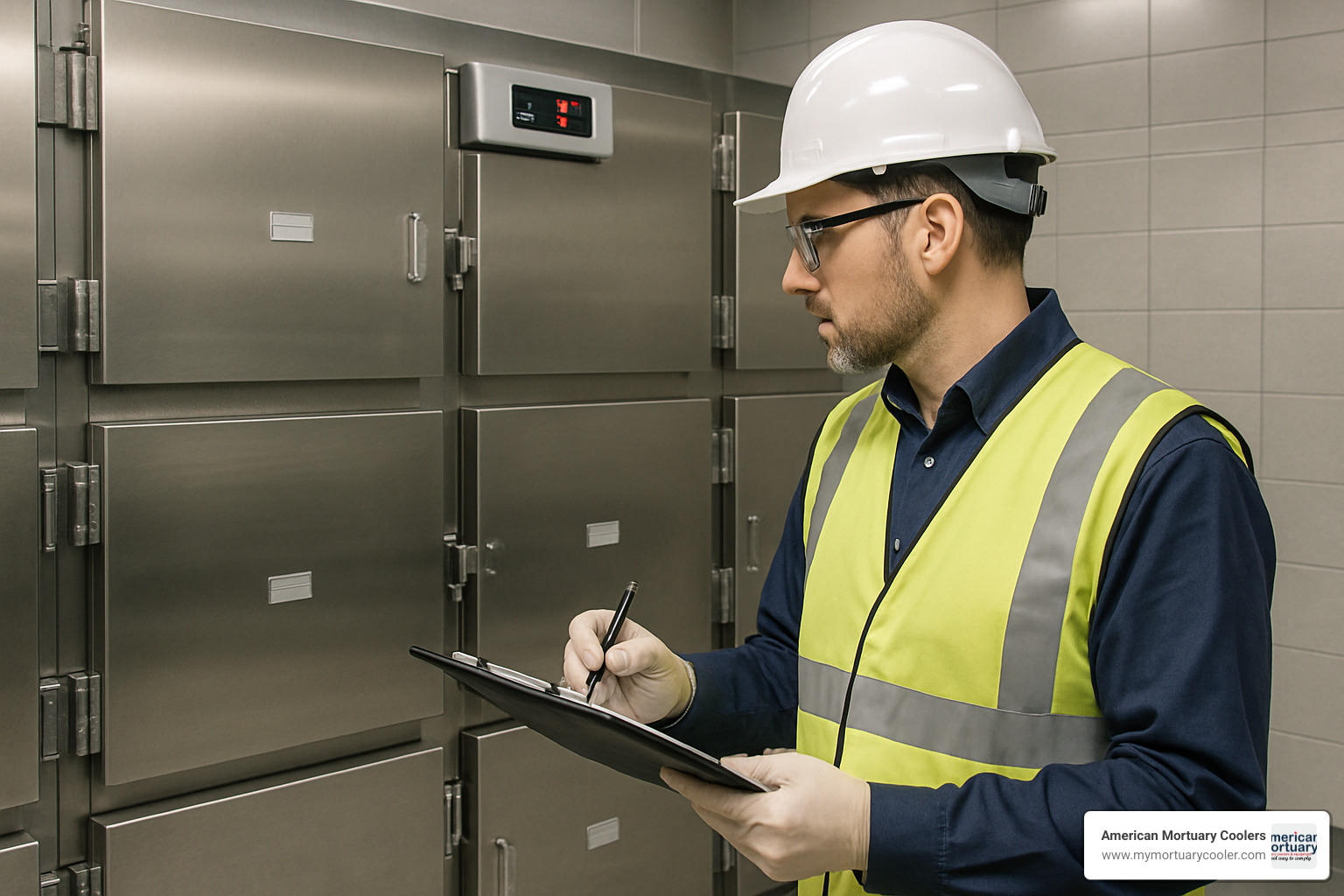
When I talk with funeral directors about choosing a manufacturer, I always emphasize looking at the company's history in the industry. There's something reassuring about working with a team that has weathered the changes in mortuary refrigeration over decades. Companies with 10+ years of specialized experience truly understand the unique requirements of preserving the deceased with dignity and care. Established manufacturers like Mortech, Mopec, and Polar King have refined their designs through years of customer feedback - and at American Mortuary Coolers, we've absorbed these industry lessons to provide solutions that really work for you.
Certifications matter too - they're not just fancy logos on a website. Quality manufacturers maintain relevant certifications like NSF certification for sanitation standards (crucial when dealing with the deceased), UL listing for electrical safety, and ISO 9001:2008 for quality management systems. These certifications ensure the manufacturer follows strict protocols in building units that comply with local building and health department codes.
The ability to customize shouldn't be an afterthought. Every facility has unique needs and space constraints. When evaluating manufacturers, look at their willingness to adjust panel thickness, offer different insulation types, provide various interior and exterior finishes, and customize racking systems and door configurations. A one-size-fits-all approach rarely works in our industry.
Installation support can make or break your experience. The best manufacturers offer comprehensive guidance including site surveys, preparation guidance, professional installation services (or detailed DIY instructions if you're handling it yourself), post-installation validation, and staff training. At American Mortuary Coolers, we've seen how proper installation sets the foundation for years of trouble-free operation.
Warranty coverage tells you a lot about a manufacturer's confidence in their product. Industry-leading warranties typically include 10-year coverage on wall and ceiling panels and at least a 1-year standard warranty on compressors and refrigeration components. Be sure to understand what's covered and what isn't - and ask about optional extended service plans if you want additional peace of mind.
Finally, be realistic about lead times. Standard units might ship within 2-4 weeks, while custom solutions typically require 6-12 weeks from order to delivery. If you're facing an emergency, ask about temporary solutions that can be deployed quickly while your permanent unit is being built.
At American Mortuary Coolers, we believe in transparency about all these factors. We want you to feel confident in your decision, knowing that your refrigeration system will serve your facility - and the families you help - reliably for years to come.
Key Questions to Ask Your Mortuary Cold Room Manufacturer
When you're talking with potential mortuary cold room manufacturers, asking the right questions helps ensure you find a partner who truly understands your needs. I've sat on both sides of these conversations, and the most successful relationships start with thoughtful questions.
Start by asking about temperature validation: "How do you verify temperature uniformity throughout the cold room?" A quality manufacturer will have a detailed process for ensuring consistent temperatures in every corner of the unit. Follow up with questions about monitoring systems - are they remotely accessible? How quickly does the system recover after door openings? These details matter when you're preserving the deceased.
Material specifications reveal a lot about quality. Ask about the R-value of the insulation panels - higher values mean better efficiency. Confirm that interior surfaces are NSF-certified for easy cleaning and sanitation. And don't forget to inquire about the load-bearing capacity of the flooring system, especially if you'll be using heavy equipment.
Energy efficiency affects your bottom line for years to come. Request the estimated daily kWh consumption for the unit you're considering. Ask if they offer high-efficiency compressors and fan motors, and whether they include smart defrost systems that minimize energy use without compromising performance.
Compliance questions protect you from future headaches. Which specific regulations and standards does the unit meet? Will they provide documentation for health department approvals? Are all electrical components UL-listed? A reputable manufacturer will have ready answers to these questions.
After-sales support can be just as important as the product itself. What's their response time for emergency service calls? Do they maintain a stock of critical replacement parts? Is preventive maintenance service available, and what does it include? The answers reveal how well they'll support you after the sale.
Think about future needs too. Can the system be expanded if your facility grows? How easily can racking configurations be modified? Are retrofit options available for technology upgrades? The best systems grow with you.
Emergency planning questions are increasingly important. What surge capacity solutions do they offer? How quickly can temporary units be deployed if needed? Do they provide rental options for seasonal or unexpected needs? No one wants to think about mass casualty events, but being prepared is essential.
Finally, ask for references and case studies from similar facilities in your region. What challenges have other clients faced and how were they resolved? Do they have case studies demonstrating long-term reliability? At American Mortuary Coolers, we welcome these questions and provide comprehensive answers to help you make an informed decision.
Comparing Top Manufacturers
| Manufacturer | Years Experience | Capacity Range | Key Certifications | Warranty | Mobile Options | Custom Features |
|---|---|---|---|---|---|---|
| Mortech | 35+ | 2-50 bodies | NSF, UL | 10yr panels, 1yr comp. | Limited | Cantilever racks, bariatric |
| Mopec | 30+ | 1-50 bodies | NSF, UL, ISO | 10yr panels, 1yr comp. | MERC System | Dual-temp, data logging |
| Polar King | 40+ | 2-30 bodies | NSF, UL | 10yr panels, 1yr comp. | Trailer units | Seamless fiberglass |
| Flexmort | 15+ | 1-20 bodies | CE, ISO | 5yr limited | ColdSpace | Curtain systems, collapsible |
| U.S. Cooler | 35+ | 3-30 bodies | NSF, UL | 10yr panels, 1yr comp. | Limited | XPS/FIP insulation options |
| Ardo | 10+ | 2-20 bodies | CE, ISO | 5yr limited | Limited | Invisible joint system |
| American Mortuary Coolers | 25+ | 1-50 bodies | NSF, UL | 10yr panels, 1yr comp. | Regional partners | Nationwide delivery, custom solutions |
This comparison highlights the strengths of various manufacturers, though your specific needs should guide your selection process. While all these companies make quality products, American Mortuary Coolers combines best practices from across the industry with our own expertise in custom solutions custom to your unique situation.
Innovations & Future-Ready Technologies
The mortuary refrigeration industry isn't static - it's evolving with technological advances that improve performance, monitoring, and sustainability. Forward-thinking mortuary cold room manufacturers are incorporating innovations that make a real difference in daily operations.
IoT sensors and remote monitoring have transformed how facilities manage their cold rooms. Imagine checking temperatures via your smartphone at 2 AM for peace of mind, receiving automatic alerts if anything deviates from set parameters, or getting predictive maintenance notifications before problems occur. These aren't futuristic concepts - they're available now from leading manufacturers.
Cloud-based data management has simplified regulatory compliance. Temperature logs are securely stored and accessible anytime, providing historical performance data that can be integrated with your facility management systems. This technology eliminates the old paper charts and provides better documentation for inspections.
Direct-contact liquid cooling, pioneered in systems like Mopec's MERC, offers more efficient cooling than traditional air-based systems. This approach reduces energy consumption while providing greater portability and deployment flexibility - especially valuable during emergency situations.
Antimicrobial technologies have taken sanitation to new levels. Some advanced units now include UV-C light systems for surface disinfection, antimicrobial interior finishes that inhibit bacterial growth, and HEPA filtration to control airborne contaminants. These features protect both the deceased and your staff.
Modular plug-and-play systems are simplifying installation and upgrades. With pre-configured electrical and refrigeration components, these systems require minimal on-site preparation and make future expansions much easier. They're particularly valuable for facilities with limited technical support.
Perhaps most exciting is the emergence of AI-driven predictive maintenance. These systems use algorithms to detect potential failures before they occur, optimize defrost cycles and compressor operation, and provide energy use analysis with efficiency recommendations. The result is lower operating costs and fewer unexpected breakdowns.
At American Mortuary Coolers, we're constantly evaluating these emerging technologies and incorporating those that provide meaningful benefits to our clients. We believe in innovation with purpose - not just adding features for marketing purposes, but integrating technologies that truly improve the preservation of the deceased and the operation of your facility.
Installation, Maintenance & After-Sales Support
The relationship with your mortuary cold room manufacturer shouldn't end with delivery. Proper installation, ongoing maintenance, and responsive after-sales support are essential components of a successful long-term investment.
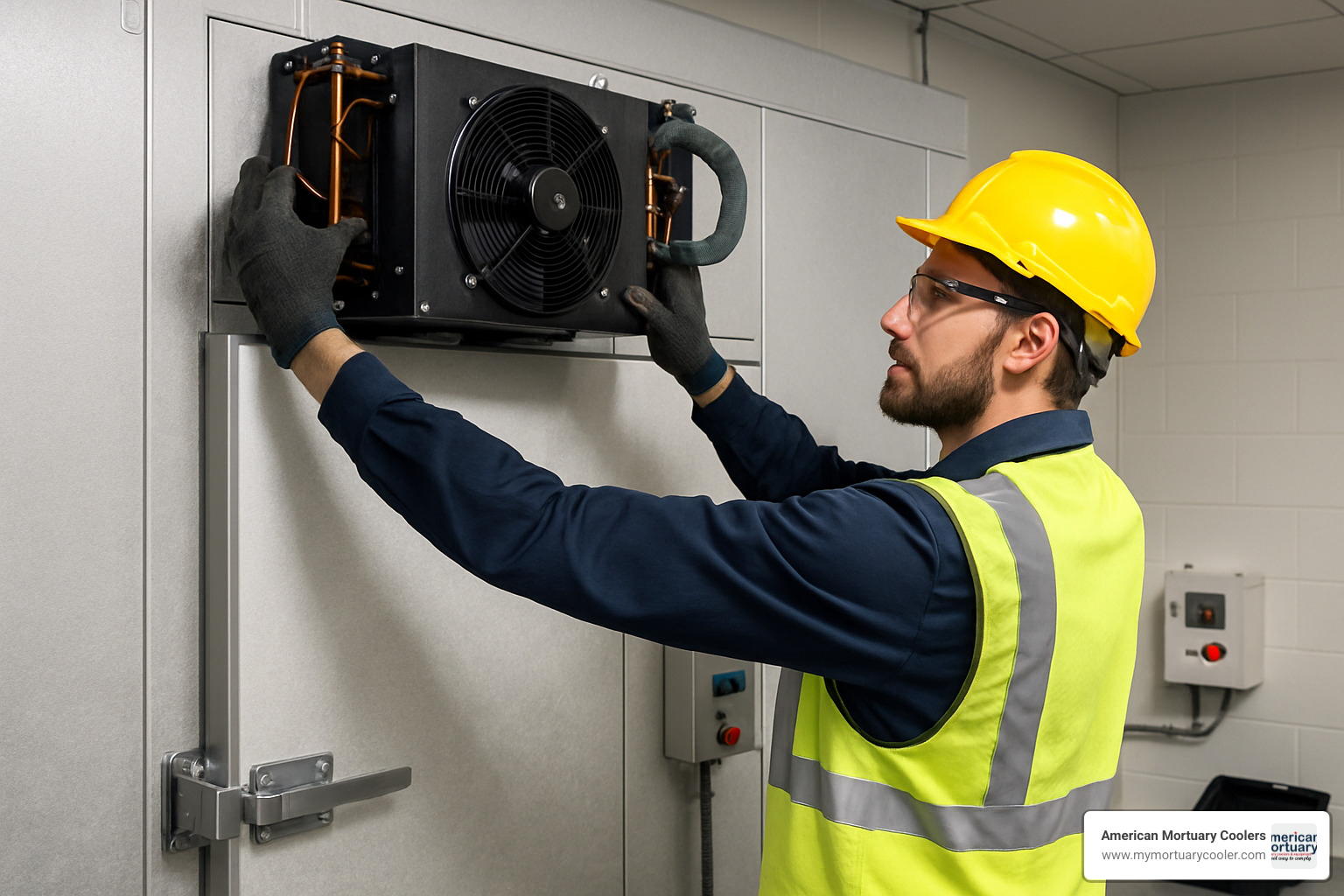
When we install a mortuary cold room at American Mortuary Coolers, we believe in starting with a thorough foundation. Every installation begins with a comprehensive site survey where we identify any potential issues before they become problems. We'll check your floor's load capacity to ensure it can support the unit properly, verify electrical requirements (most units need 220V/3-phase power), and plan a clear path for panel delivery.
Think of the installation as building a puzzle - but one where every piece must fit perfectly. We typically start with the floor panels, making sure they're properly leveled. Then come the wall panels, connected via either cam-lock or tongue-and-groove systems. The ceiling panels go on next, followed by the door frame and door mounting. After the structure is complete, we install the refrigeration system, build out the interior racking, connect all electrical components, and finally, conduct thorough testing to validate temperature consistency.
"The quality of installation directly impacts the longevity of your system," explains one of our senior technicians. "Cutting corners during setup almost always leads to problems down the road."
Keeping your cold room running smoothly requires regular attention. Daily temperature log reviews might seem tedious, but they're your first line of defense against potential issues. Weekly checks of door gaskets and seals prevent cold air leakage, while monthly cleaning of condenser coils and evaporator fans ensures optimal efficiency. We recommend quarterly professional inspections of all refrigeration components and annual comprehensive evaluations of the entire system.
Modern mortuary cold rooms come with sophisticated remote diagnostic capabilities. This technology allows our technicians to troubleshoot many issues without an on-site visit, saving you time and minimizing disruption. Software updates can often be installed remotely, keeping your system current without the need for service calls.
Warranty & Service Levels Explained
Understanding warranty coverage can feel like deciphering a foreign language, but it doesn't have to be complicated. Most quality mortuary cold room manufacturers offer tiered protection that balances coverage with cost.
Standard warranty packages typically include 10-year limited coverage on insulated panels - these rarely fail, but the long coverage period provides peace of mind. The refrigeration components usually carry a 1-year warranty on compressors and related parts, with similar coverage for control systems. Consumable items like door gaskets generally have shorter 90-day warranties, as they naturally wear with regular use.
"We see the warranty not as a legal obligation, but as a promise to stand behind our products," says our warranty manager at American Mortuary Coolers. "When something goes wrong, we make it right - it's that simple."
For many facilities, extended warranty options make financial sense. A 4-year compressor exchange program can protect against the most expensive potential repair, while extended parts coverage for 2-5 years provides broader protection. When evaluating these options, consider your facility's budget cycle and risk tolerance.
Service level agreements come in different tiers to match your needs. Basic plans offer business hours support with 24-48 hour response times, while premium packages provide 24/7 support with same-day emergency response. For critical facilities, these premium plans offer invaluable peace of mind.
Preventive maintenance contracts are worth their weight in gold. Regular system inspections catch small issues before they become big problems, and having priority scheduling means you're first in line when service is needed. These contracts typically include documentation that helps with regulatory compliance - another headache avoided.
One funeral director shared a story that highlights the importance of solid support: "When our system had an issue during a holiday weekend, American Mortuary Coolers' service partner was here within hours. That level of support is invaluable in our industry where delays simply aren't an option."
For quick verification of your coverage, many manufacturers offer online warranty lookup tools, such as Polar King's Asset Lookup.
The best warranty is the one you never need to use. Quality equipment, properly installed and maintained, will serve your facility reliably for years to come. But knowing you have solid backup if something does go wrong lets you focus on what matters most - caring for families during their time of need.
Frequently Asked Questions about mortuary cold room manufacturer
How long does installation typically take?
When you're planning for a new mortuary cold room, timing is everything. Installation schedules vary based on the size and complexity of your chosen system, but we've found most projects follow predictable timelines.
For smaller body box units that hold 1-3 bodies, you're looking at a quick turnaround – typically just 1-2 days from delivery to full operation. Medium-sized walk-in units with capacity for 5-15 bodies usually require 2-4 days for complete setup, while our larger systems that accommodate 20+ bodies may need 5-7 days for proper installation and thorough testing.
"We had our 6-body walk-in installed in just three days," shared one funeral director in Oklahoma. "The American Mortuary Coolers team had everything planned so precisely that it went much smoother than we expected."
These timelines assume your site is properly prepared beforehand. We provide detailed pre-installation checklists and can connect you with trusted local contractors if your space needs modifications. Factors that might extend your installation timeline include tricky access points to your installation location, specialized electrical requirements, custom interior configurations, or integration with existing building systems.
What is the lifespan of a mortuary cold room?
A quality mortuary cold room is a long-term investment in your facility. With proper care and maintenance, systems from a reputable mortuary cold room manufacturer will serve your needs reliably for 15-20 years or more.
Different components naturally have varying lifespans. The insulated panels that form the structure of your cold room typically last 20+ years under normal conditions. Refrigeration compressors generally provide 7-10 years of reliable service with proper maintenance, while evaporator and condenser coils often reach the 10-15 year mark before needing replacement.
Some components require more frequent attention – door gaskets and seals typically need replacement every 3-5 years as they experience the most wear and tear. Control systems generally function well for 8-12 years, though many facilities choose to upgrade these earlier to take advantage of new technology and improved efficiency.
Several factors influence how long your system will last. Units that experience frequent door openings typically see more wear on components. The ambient temperature and humidity where your unit is installed also play a role – extreme conditions can stress systems more heavily. Perhaps most importantly, following recommended maintenance schedules can dramatically extend the life of all components.
At American Mortuary Coolers, we focus on building systems that stand the test of time. Our stainless steel interiors typically outlast aluminum or coated options, providing better long-term value despite a slightly higher initial investment.
Can a unit be expanded after initial installation?
Yes! We design many of our mortuary cold rooms with future growth in mind. The good news is that expansion is often quite feasible, especially if you plan for it from the beginning.
Our modular panel systems, which use either cam-lock or tongue-and-groove connections, are specifically designed for potential reconfiguration. This makes adding additional capacity much simpler than starting from scratch. The process works best when your original installation included some forethought about expansion possibilities, when there's adequate space available for growth, and when your existing refrigeration system has some extra capacity.
Speaking of cooling capacity, this is a key consideration in any expansion plan. For modest increases in size, your existing refrigeration system might be perfectly adequate. More substantial expansions typically require upgraded compressors and evaporators to maintain proper temperatures. For larger facilities, we often recommend dual-system setups that provide both increased capacity and valuable redundancy.
The interior components of your mortuary cold room are generally the most adaptable elements. Additional racking can be easily added to existing walk-in units, shelving configurations can be modified to increase capacity, and new technology can often be retrofitted to older systems.
"We started with a 6-body system five years ago," explains a funeral home director from Texas. "When our needs changed, American Mortuary Coolers helped us expand to a 12-body capacity without having to replace the entire unit. The process was remarkably straightforward."
At American Mortuary Coolers, we believe in designing with your future needs in mind. We help facilities make current investments that won't become obsolete when circumstances change, saving you money and hassle in the long run.
Conclusion
Selecting the right mortuary cold room manufacturer is a decision that impacts not only your facility's operational efficiency but also the dignity with which you care for the deceased. Throughout this guide, we've explored the critical factors that define quality in mortuary refrigeration:
- Precise temperature control systems that maintain the optimal 2-5°C range
- Durable construction materials including high-density polyurethane insulation
- Customization options that adapt to your specific space and capacity needs
- Compliance with health and safety standards including NSF and UL certifications
- Energy efficiency features that reduce operational costs
- After-sales support and warranty coverage that protect your investment
At American Mortuary Coolers, we've built our reputation on addressing these factors with attention to detail and commitment to quality. Based in Tennessee with distribution capabilities across the contiguous 48 states, we specialize in crafting custom mortuary coolers that meet the unique needs of each facility we serve.
Our evaluation process helps facilities create a comprehensive checklist for selecting a manufacturer:
- Define your specific capacity and space requirements
- Identify must-have features versus nice-to-have options
- Consider future expansion needs and flexibility
- Evaluate energy efficiency and operating costs
- Review warranty coverage and service availability in your region
- Check references from similar facilities
- Assess manufacturer experience and industry reputation
The lowest initial price rarely represents the best long-term value. Quality construction, energy efficiency, and reliable performance ultimately deliver greater return on investment through lower operating costs and longer service life.
More info about morgue cooler solutions
The respectful storage of the deceased deserves nothing less than thoughtful consideration and quality equipment. By choosing a reputable mortuary cold room manufacturer with proven experience and comprehensive support, you ensure that this sacred responsibility is met with the highest standards of care and dignity.


















